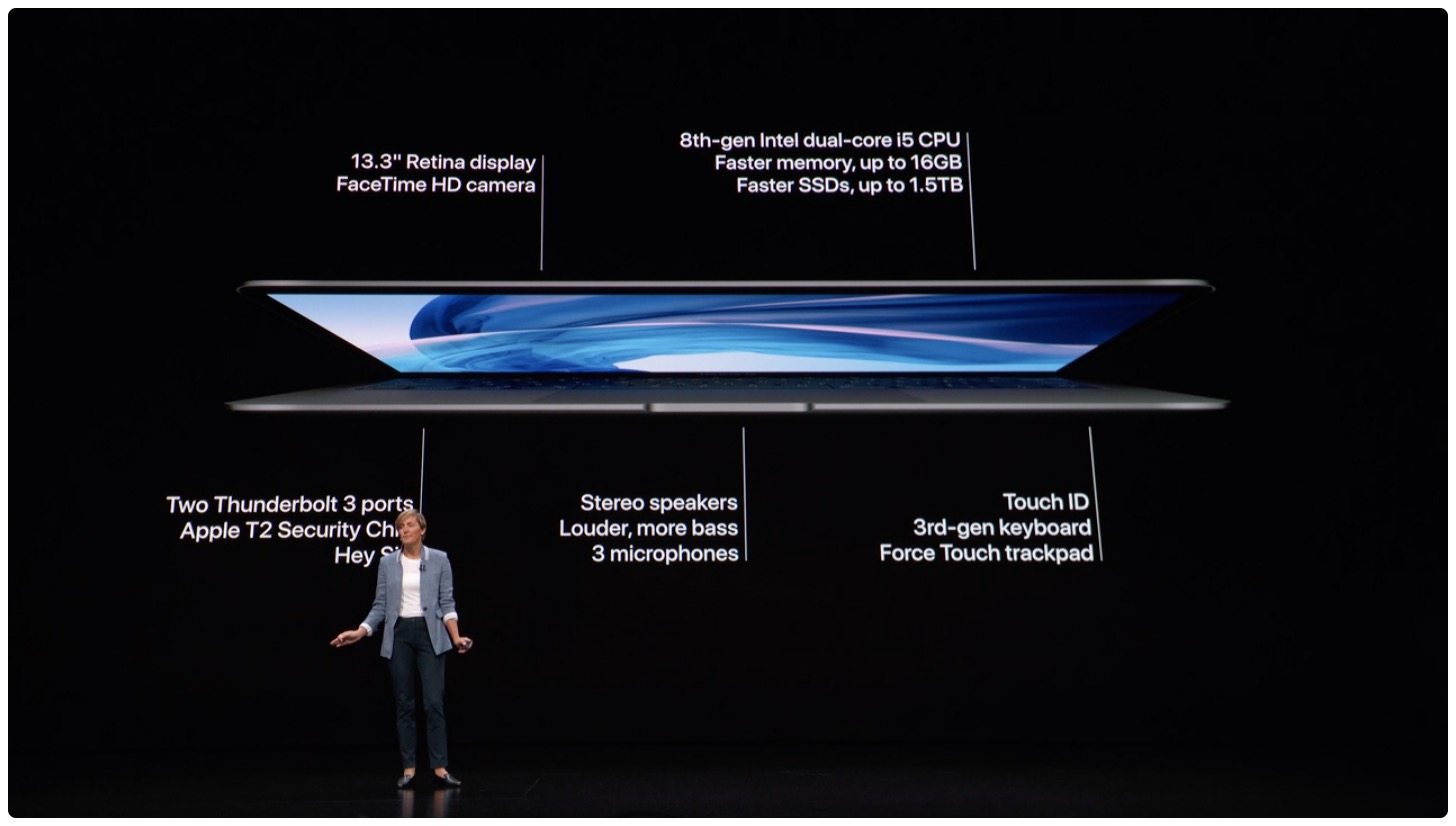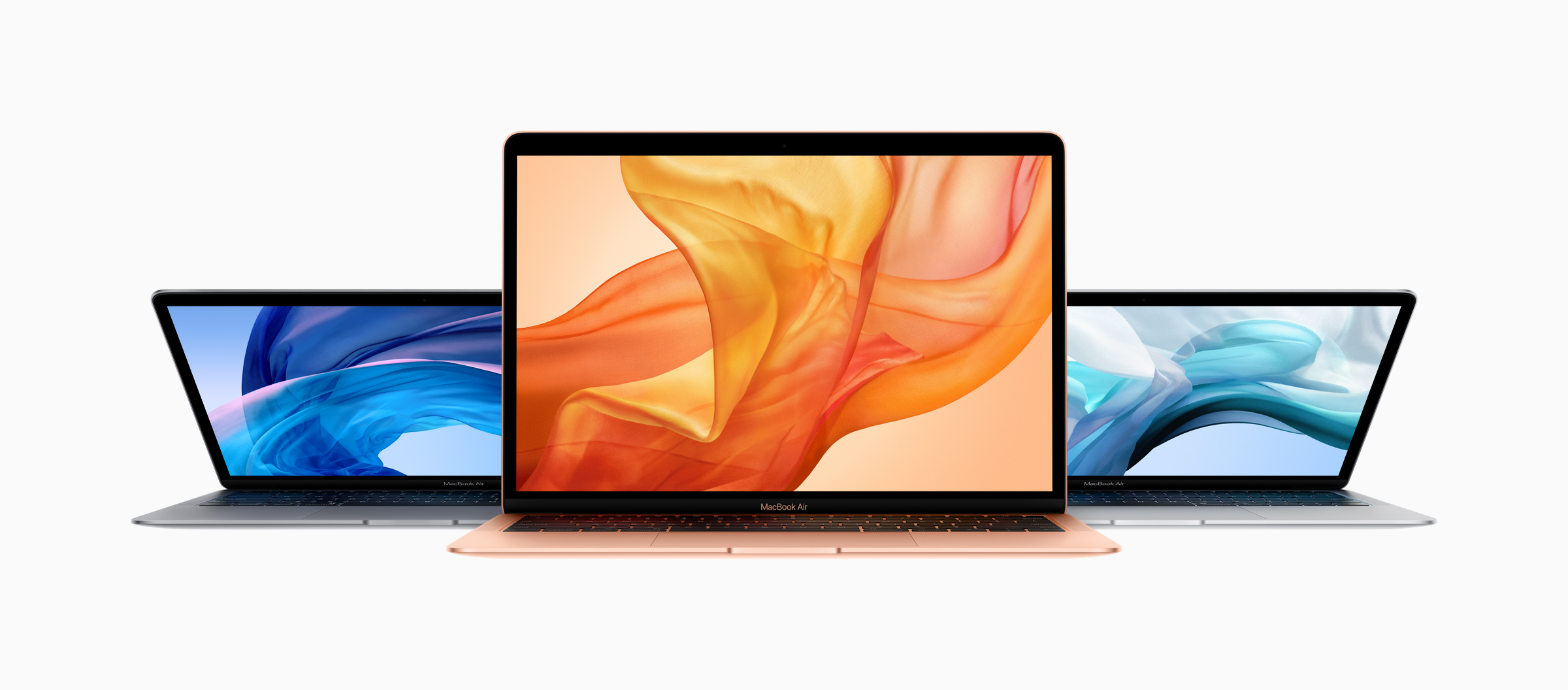
First synthetic Geekbench benchmarks of the most popular Apple notebook are here.
The scores show moderate CPU gains for Apple’s new MacBook Air model, that was unveiled last week, compared against 2017’s model or the one-port 12-inch MacBook notebook.
The scores
For better comparison, here are your single and multi-core Geekbench scores for several recent Mac notebook models, including last year’s Air and the 12-inch MacBook, via MacRumors.
- Single-core performance
- 2018 MacBook Air (1.6GHz) — 4,248
- 2017 MacBook Air (1.8GHz) — 3,335
- 2017 MacBook (1.4GHz) — 3,925
- 2017 MacBook (1.3GHz) — 3,630
- 2017 MacBook (1.2GHz) — 3,527
- 2018 MacBook Pro (2.3GHz) — 4,504
- 2017 MacBook Pro without Touch Bar (2.3GHz) — 4,314
- Multi-threaded performance
- 2018 MacBook Air (1.6GHz) — 7,828
- 2017 MacBook Air (1.8GHz) — 6,119
- 2017 MacBook (1.4GHz) — 7,567
- 2017 MacBook (1.3GHz) — 6,974
- 2017 MacBook (1.2GHz) — 6,654
- 2018 MacBook Pro (2.3GHz) — 16,464
- 2017 MacBook Pro without Touch Bar (2.3GHz) — 9,071
Let’s interpret the numbers.
Faster than 2017 Air & 12″ MacBook
With single and multi-core scores of 4,248 and 7,828, respectively, the new Air outperforms the 2017 model powered by a fifth-generation 1.8GHz dual-core i5 “Broadwell” chip (single-core — 3,335; multi-core — 6,119). In other words, the new Air shows a 27% gain in single-core performance and a 28% faster multi-threaded performance over 2017’s MacBook Air.
We’re also not surprised seeing the 2018 MacBook Air outperform the 12-inch MacBook: the baseline MacBook takes advantage of Intel’s lower-powered Core M chip which is significantly slower than the new Air’s eighth-generation “Amber Lake” processor.
Specifically, the base MacBook powered by Intel’s 1.2GHz Core M chip earned 3,527 in single-core testing and 6,654 in multi-core tests. In other words, the new Air performs 20% faster than the base MacBook in single-core tests and features 18% faster multi-threaded performance.
Now, some folks have said the new Air is but a reworked MacBook Pro without Touch Bar.

That machine, which Apple still sells priced $100 more than the new Air, earned a single-core score of 4,314 and a multi-core score of 9,071. This means that the new Air does beat 2017’s 13-inch MacBook Pro without Touch Bar in single-core performance but not by much. In multi-core tests, the Touch Bar-less Pro outperforms the new Air by about 16%.
Lastly, the Air cannot touch 2018’s 13-inch MacBook Pro which shows more than 2x multi-core score (16,464) but only a modest 6% gain in terms of single-core performance (4,504).
Summing up
The new MacBook Air beats 2017’s model and all standard 12-inch MacBook configurations but cannot compete with the more powerful MacBook Pro line even at the base level—that’s why the Touch Bar-less Pro is $1,299 whereas the new Air starts a $100 cheaper at $1,199.
If you take a closer look at Apple’s pricing matrix for all the notebooks it currently makes, you’ll see that the current pricing scheme does in fact reflect the fact that the new Air is faster than the 12-inch MacBook but comes behind the 13-inch MacBook Pro without Touch Bar.
AnandTech speculated that Apple probably chose the lower-powered “Amber Lake” chips for the new Air because it made a conscious decision to trade efficiency for performance potential.
It’s unclear at this point whether Apple will refresh the 12-inch MacBook with the processor in the new Air or maybe discontinue the MacBook line. If you ask me, the new Air is practically an updated MacBook. It seems to us that Apple has decided to keep the Retina moniker purely for marketing purposes instead of calling the new Air a next-gen MacBook.
The Air moniker will have to be retired at some point so that we’re only left with the MacBook and the MacBook Pro line, similar to the iPad-iPad Pro distinction. However, we don’t really see this happening in the near term as Apple’s naming scheme is currently all over the place.
The chip controversy
The new Air drew controversy for its choice of a lower-powered Intel chip.
The Geekbench entry for the new MacBook Air lists the notebook as running Intel’s just-announced Core i5-8210Y processor. This is Intel’s lower-power 7W “Amber Lake” CPU platform with Turbo Boost up to 3.6GHz, 4MB of L3 cache, Intel’s integrated UHD Graphics 617 and support for up to 16GB of 2133MHz LPDDR3 memory.
The energy-efficient 14nm processor is a step up from the Broadwell architecture powering the previous Air. It gives the new Air its impressive battery life compared against the 15W U-series chips used in the previous Airs. According to Apple, the new Air lasts up to 12 hours while browsing the web over Wi-Fi, 13 hours while watching iTunes movies or 30 days on standby.
Intel has probably given Apple early access to this recently-announced processor because its technical specifications conveniently went live right following the Apple event. This reminds us of the original MacBook Air, which similarly was powered by an unreleased Intel chip that wouldn’t become available to rival PC makers for months to come.
Yesterday, we showed you some early Geekbench scores for the new iPads that prove Apple’s claims that the new iPad Pro outperform the vast majority of PCs manufactured in the last twelve months.
Your analysis
What do you make of this Geekbench scores for the new Air?
Does Apple’s processor choice concern you?
Let us know by leaving a comment below!